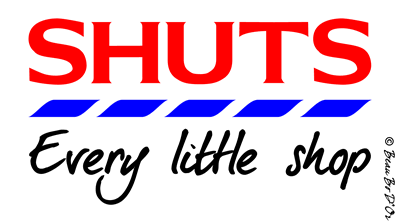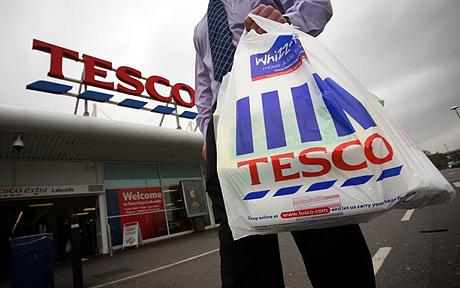Diary of a Domestic Extremist – The New Empires
Columns, Diary of a Domestic Extremist - Posted on Wednesday, September 1, 2010 12:00 - 8 Comments
It’s hard to walk anywhere in my hometown these days without coming across the familiar red, blue and white logo. Every vacant building seems to be in the process of conversion into a new Tesco Express. In the past month, three supermarkets have opened within 10 minutes’ walk of my house – 2 Tescos and a Lidl. Even prominent members of the City Council have spoken out against Tesco’s domination in the area.
75% of the grocery market is accounted for by the four biggest supermarket chains: Tesco, Asda, Sainsbury’s and Morrisons. Of these four, Tesco is streets ahead with 31% of the total market. It isn’t exaggeration to emphasise its dominance, it is the second largest retailer in the world in terms of its profits, which were £3.4bn this year. It has around 2,500 stores in the UK alone, and hundreds more in countries such as Thailand, Poland and South Korea.
So what’s the problem? Tesco and their rivals, like all transnational corporate empires, pursue the aggressive capitalist aim of profit above everything else. That means that workers’ and animal rights, the environment and consumer health will always be exploited by the supermarkets in order to maximise profit. This is, of course, true of smaller shops operating within the capitalist system as well. But increasing the scale of business increases the owners’ bargaining power against the farmers and garment workers, leads to battery farming and monoculture and takes money away from local communities.
The impacts of the super-supermarkets are detailed at the excellent Tescopoly site. To put it at its simplest, the big chains, through their dominating position within the market, dictate terms, conditions and prices to their suppliers. Those who complain about the terms will be rejected in favour of those who are more compliant. The bad deals that farmers and producers have to put up with mean that they often end up exploiting their own workers more to minimise costs. This means that wages are rock-bottom for pickers in the plantations (as little as 33p per hour) and there is routine flouting of health and safety regulations e.g. around the spraying of pesticides. Workers are frequently fired and rehired for less pay and poorer conditions. Whilst these impacts are worst in countries without legal protections for workers, the ability of the big stores to move to where costs are lowest has led to mass redundancies and the exploitation of vulnerable workers in the UK as well.
Big chains inevitably mean big waste and big energy expenditure. Tesco and others’ reliance on a global supply chain means that foods are flown and shipped around the world and then trucked around the UK to get to your “local” store. The size of big supermarkets makes them massively energy inefficient and their location on the outskirts of town means that you have to travel by car to use them. In addition, the ability of big chains to set exacting terms to its suppliers means that the quantity of perfectly good food that is rejected on cosmetic grounds and wasted is constantly increasing.
Whilst the use of animals as a production line for meat and other foods is inherently exploitative, the demand for cheap meat, eggs and milk that supermarkets stipulate on their suppliers, means smaller cages, bigger factory farms and worse conditions for the animals.
 Then, of course, there is the devastating effect that multinationals have on local economies. Tesco and others often woo locals with reassurances about job creation, but their stores, inevitably, take business away from small, independent shops which are actually owned by members of the community. Whereas local fruit and veg shops may be run with a level of flexibility around credit for those who are hard-up, and may stock local produce from allotments, etc, this cannot be said of the giants. Whilst the local shop might double as a place for the community to keep in touch and used as a notice board, the supermarket is an impersonal monster.
Then, of course, there is the devastating effect that multinationals have on local economies. Tesco and others often woo locals with reassurances about job creation, but their stores, inevitably, take business away from small, independent shops which are actually owned by members of the community. Whereas local fruit and veg shops may be run with a level of flexibility around credit for those who are hard-up, and may stock local produce from allotments, etc, this cannot be said of the giants. Whilst the local shop might double as a place for the community to keep in touch and used as a notice board, the supermarket is an impersonal monster.
In many ways, multinationals are the new empires. Through exacting tribute and imposing their administrative centres around the UK they ensure their insertion into every sinew of our everyday lives. This power is achieved through their colonies abroad, in countries so desperate for the cash they deregulate their own economies, thus condemning workers to lives of poverty and misery. The modern retail empires reshape life itself, through massive plantations of crops or the boxing of animals into tinier and tinier spaces to maximise profit.
There is a diffuse but growing resistance to the Tesco empire. Across the country community groups are mobilising to oppose planned developments. This is being fought through the planning process, through squatting proposed sites (such as the Jester’s Comedy squat in Bristol and the Lewes Road community garden in Brighton) and through sabotage and direct action. This movement should be seen as one of resistance to a modern colonisation process as much as it is anti-capitalist and in defence of the environment. The message is that Tesco and other corporate occupiers are not welcome in our communities and that we want them to leave.
Something for you to ponder when you’re next waiting at the checkout…
Mikhail Goldman, (a.k.a. The Domestic Extremist) currently focusses his trouble-making and incitement in the Midlands area. His favourite activities are bringing down the system and enjoying a good cup of tea.
His column appears every Wednesday.
8 Comments
Ceasefire Magazine – Devil’s Advocate: In defence of Tesco
Ed
I think you’re going to have to substantiate some of these claims, in order to be convincing. Why do big chains inevitably mean big waste and big energy expenditure? Put some numbers to that. I would suspect big chains lead to less waste and less energy expenditure, as efficiencies in those areas pay greater dividends.
You have also skillfully ignored the benefit to those who are hard-up of the cheaper prices. If you have little money, do you prefer the option of possible credit or lower prices?
Mik
My goodness. People really don’t like having their shopping habits challenged do they?
“Why do big chains inevitably mean big waste and big energy expenditure? ”
Big chains in Britain create large amounts of food waste because of the issue of brand image. Food that is perfectly edible but doesn’t look the way the marketers want it to look gets binned before it sees the shelves. Fresh produce that is still edible but is at the stage where a few items are past it gets binned en masse. A disgraceful waste of produce. As to the energy expenditure issue – the transnational nature of the modern grocery business inevitably means that foods are imported from around the globe because they can be produced more cheaply in far away places, even though the same crops can be grown locally. That is a business model that the multinational supermarket can use to its advantage. There is also the issue of over packaging – another attempt to market crap food for something more appealing than it really is. The style over substance game can only be played by big companies with big resources.
“You have also skillfully ignored the benefit to those who are hard-up of the cheaper prices. If you have little money, do you prefer the option of possible credit or lower prices?”
As Tescopoly note “Travel costs to go food shopping added 23% to the shopping budget of low income families.” Big Tesco superstores are often only accessible to those with cars and the money to fuel them. It’s also not universally true that supermarkets are cheaper. Some studies have found cheaper produce available in local markets than there is in supermarkets near by. There is also the question of why we should accept the social stratification around consumer health that Tesco and their ilk exacerbate with Tesco Value goods packed full of unhealthy preservatives such as salt. Their offers are frequently on nutritionally poor food and snacks. I myself live on a low income and manage to find much better quality food in local shops for reasonable prices. Perhaps I’m just lucky to have good shops near by but I’m sure I’m not the only one.
Ed
Err you’re confused, I don’t shop at Tesco.
The issue with your argument is that it’s based on assertions. They bin edible food? I don’t doubt it. Do they bin significantly more than the local independent shop? Not so sure. They source their food from across the world? Definitely. Is a fully laden ship cruising the world at an economical pace worse for the environment than a near-unladen van driving from a ‘local’ farm at an uneconomical speed? Not so sure. The packaging issue is perfect for showing what Omer describes in his article; there has been some public reaction against excessive packaging, things are packaged less. More public reaction can further this. This is a good thing. You’re right when you say the current capitalist system encourages companies to focus on profit even to the exploitation of the environment/animals/people; where I think we disagree is the extent to which exploitation of them actually effects profit. Sure, the companies are amoral, but the bad publicity is not worth it to them, in terms of profit.
I gotta question the 23% figure you give. It seems extraordinarily high for what, in most places, must essentially be a bus ride. I tried to check out the Tescopoly site, but it redirected to a false web address. I tried to check out [what I think is] the NCH website and can’t find the research. Where exactly is this research?
Ed- try getting the bus with two kids and a week’s worth of shopping for four.
Ed
??? That doesn’t effect the cost. And lots of people do that. I’ve been on buses where that happens (with my own TWO weeks’ shopping; it happens that I don’t have kids – but that does not stop me questioning the figure of 23%).
Sara
Ed- what it might mean is that if you are low-income with kids you most likely don’t have a car. so you try and save money by going to tesco but then the kids start crying and fighting, the plastic bags wrip and food starts falling all over the floor, the buggy falls backward, it starts to rain and you’re like fuck it we’ve got to get a taxi- so you spend like £30 and you end up spening another £6 on the taxi
Tesco: Whatever Next? « The Green Review
[…] services? For me, this just looks like the slippery slope down into “Tesco World” where independent business and freedom of choice is quashed by the few multinational corporations who can afford to do everything. That’s not the […]



[…] Omer Ali In his most recent piece, my fellow columnist, Mikhail “Domestic Extremist” Goldman, decries the growth of […]